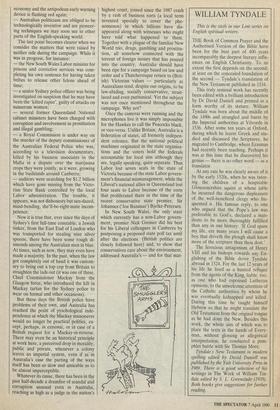WILLIAM TYNDALE
This is the sixth in our Lent series on English spiritual writers.
THE Book of Common Prayer and the Authorised Version of the Bible have been for the best part of 400 years incomparably the deepest literary influ- ences on English Christianity. To an extent the first depends on the second; at least on the concealed foundation of the second — Tyndale's translation of the New Testament published in 1534.
This truly seminal work has recently been edited with a brilliant introduction by Dr David Daniell and printed in a form worthy of its stature. William Tyndale was born about the middle of the 1490s and strangled and burnt by the Imperial authorities at Vilvorde in 1536. After some ten years at Oxford, during which he learnt Greek and stu- died and discussed the Scriptures, he migrated to Cambridge, where Erasmus had recently been teaching. Perhaps it was at this time that he discovered his genius — there is no other word -r-- as a translator.
At any rate he was clearly aware of it by the early 1520s, when he was tutor- ing the children of a hospitable Gloucestershire squire at whose table he incurred the dangerous displeasure of the well-beneficed clergy who fre- quented it. His famous reply, to one who argued that the Pope's law was preferable to God's, declared a man- ifesto to be more thoroughly fulfilled than any in our history: `If God spare my life, ere many years I will cause a boy that driveth the plough shall know more of the scripture than thou dost.'
The ferocious antagonism of Henry VIII and his bishops towards any En- glishing of the Bible drove Tyndale abroad in 1524. For the last 12 years of his life he lived as a hunted refugee from the agents of the King, liable, too, as one who had espoused Lutheran opinions, to the unwelcome attention of the Catholic authorities by whom he was eventually kidnapped and killed. During this time he taught himself Hebrew so that he might translate the Old Testament from the original tongue as he had done the New. Besides this work, the whole aim of which was to place the texts in the hands of Every- man, without glossing or allegorical interpretation, he conducted a pam- phlet battle with Sir Thomas More.
Tyndale's New Teitament in modern spelling edited by David Daniell was published by the Yale University Press in 1989. There is a good selection of his writings in The Work of William Tin- dale edited by S. L. Greenslade (1938). Both books give suggestions for further reading.


























































 Previous page
Previous page